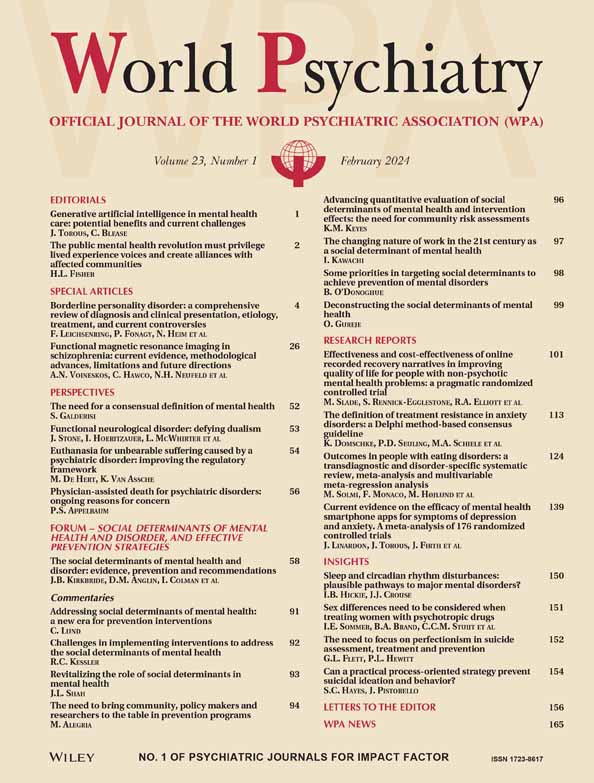Designing and delivering mental health literacy strategies in elite sport
At the 2005 World Congress of Psychiatry in Cairo, the WPA Executive Committee approved the establishment of a new Scientific Section dedicated to Exercise and Sport. This was the first truly global organized sports psychiatry organization, which was followed by the development of the International Society for Sports Psychiatry. In the subsequent twenty years, the attention to physical exercise as an essential component of lifestyle interventions in persons with mental health problems has remained constant in the WPA1-8. At the same time, mental health symptoms and disorders affecting many individuals within elite sport – including athletes, coaches, staff, officials and fans – have been a major focus of the WPA Section on Exercise and Sports Psychiatry9.
Mental health literacy has become an important strategy to help prevent and address mental health symptoms and disorders in this population. Traditionally, mental health literacy approaches have tried to provide individuals with accurate and up-to-date information to identify mental health symptoms and disorders as well as various forms of treatment; ways to understand, address and prevent personal and public stigma associated with mental health; and steps to shift attitudes and help individuals feel confident to seek mental health support.
Mental health literacy in this area has evolved in recent years, from a position where individuals would receive mental health information so that they could make specific decisions to improve their own health, to a position where sporting organizations need to enact reforms so that they can structure environments which may be conducive to promote mental health for all. This evolution of mental health literacy has meant that a more ecologically focused approach to mental health promotion has occurred, and that a collective spirit is needed for the sustained mental health of all individuals in elite sport. As mental health literacy strategies continue to evolve, it is necessary to understand that they are going to be designed in an evidence-based manner that is culturally competent and rooted in sound pedagogy10.
Establishing evidence-based practice is a difficult, time consuming, and ever evolving process where constant updates are required. In order for mental health literacy strategies to be designed and delivered to the highest standards possible, they need to engage in a five-step process that helps establish evidence-based practice11: question formulation (e.g., what is the focus of the mental health literacy strategy?); information retrieval (e.g., where should mental health information be obtained?); information evaluation (e.g., what evidence should be used to inform the training?); prescription (e.g., how should information be delivered to participants?); and follow-up (e.g., what checks need to be in place to ensure that information was understood by participants?).
Establishing the focus of any mental health literacy strategy is vital to its success. Mental health literacy providers need to consider if the strategy is aimed at individuals within elite sports (e.g., athletes, coaches, officials, fans), medical professionals (e.g., sport psychologists, clinical psychologists, social workers, psychiatrists), or organizations (e.g., sports teams, leagues, federations).
Strategies that target individuals should be designed to provide appropriate and understandable information on mental health symptoms and disorders, known benefits and barriers to treatment, ways to shift negative attitudes to mental health symptoms and disorders as well as treatment, strategies to build confidence in help-seeking behaviours, and pathways to access care easily. Strategies for medical professionals can be designed to provide information on diagnosis (e.g., after on-the-field concussions), treatment options (e.g., psychotherapy, pharmacology, self-care), treatment access (e.g., ways to make appointments), treatment delivery (e.g., online, in-person), treatment goals (e.g., return to play, recovery, retirement), treatment assessment (e.g., adherence to treatment), and ways to work with groups that have been traditionally marginalized in sport (e.g., lesbian, gay, bisexual and transgender people). Strategies for organizations have an environmental focus on regulations and policies to ensure that information on and services for mental health symptoms and disorders are established, available, and easy to access. Additionally, the culture of the sport should be examined for ways to reduce stress as well as specific symptoms and disorders that may be prevalent in that environment.
Regardless of target audience, information presented to individuals must be of the highest quality, and strategies to enhance information retrieval and evaluation need to be considered. In essence, the best current and available information is often found within meta-analyses and systematic reviews. These are often based on randomized controlled trials and offer the highest level or gold standard of evidence. Scoping and narrative reviews may lack systematic protocols and therefore may present information in a biased manner. Quasi-experimental studies, cohort studies, case-controlled studies, case studies, editorials, expert opinions, and anecdotes offer progressively weaker evidence. Caution should be used when incorporating these forms of evidence, with limited research and quality expressed transparently to participants.
The delivery of content to participants is also of tremendous importance in any mental health literacy strategy, in order for information to be understood, retained, and ultimately used in the future12. Mental health literacy strategies in this area must be designed in a theoretically and pedagogically sound manner, where high-quality information is distilled, translated and ultimately disseminated. The content of any mental health literacy strategy must shift attitudes and strengthen self-efficacy, along with a host of other psychological learning factors to modify behaviours. Pedagogically, employing a constructivist approach allows participants to be active in their learning process as information is used to create knowledge that will be used to inform their practice. Materials used in mental health literacy strategies should be convenient, engaging, visually stimulating, and help reinforce the participants’ purpose and objectives. Appropriate follow-up with participants is essential to examine how information was understood and used. Following up with participants provides further opportunities to modify mental health literacy strategies in the future.
As mental health literacy strategies in elite sport continue to evolve, so too must strategies that underpin their success. High-quality evidence, along with conceptual and theoretical models of appropriate information delivery, will need to be increasingly used in the future.




